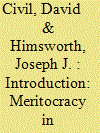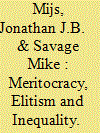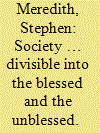| Srl | Item |
| 1 |
ID:
174004


|
|
|
|
|
| Summary/Abstract |
Sixty years after its publication, Michael Young’s The Rise of the Meritocracy remains one of the most important texts for understanding the changing intellectual politics of postwar Britain. Young’s fictional vision of a meritocratic society explores the consequences of a society where each citizen is judged according to the formula ‘I.Q. + Effort = Merit’. The successful meritocrats hoard ever‐greater rewards for themselves, crystallising into a rigid and repressive elite who rule over an increasingly powerless and depressed underclass. While the concept has evolved and adapted, the language of meritocracy is one of the great survivors of postwar British politics. In an age characterised by the rise of populist leaders and movements, as well as a backlash against educated ‘liberal elites’, revisiting, reinterpreting and re‐evaluating Young’s influential satire and the central place the concept of meritocracy occupies in the history of postwar Britain has never been more important.
|
|
|
|
|
|
|
|
|
|
|
|
|
|
|
|
| 2 |
ID:
174007


|
|
|
|
|
| Summary/Abstract |
The appeal of meritocracy is plain to see, because it appears to promote equality of opportunity. However, in this paper we argue that meritocracy is also a deeply elitist project. Firstly, we place Michael Young in context to show how his critique of meritocracy should be understood as a socialist vision to ameliorate class divides. Secondly, we show how economic inequality in the UK has not generated systematic resistance: in fact, inequality and belief in meritocracy have gone hand in hand. Thirdly, we argue that people see their own lives as meritocratic rather than ascribed, and that such values are deeply embedded in popular life. We offer two explanations for how such views have come about, and show how they have helped construct a more unequal society.
|
|
|
|
|
|
|
|
|
|
|
|
|
|
|
|
| 3 |
ID:
174005


|
|
|
|
|
| Summary/Abstract |
‘Meritocracy’ continues to unfold as both core conceptual framework and political ideal of the language of social mobility. In recent decades, politicians of various hues have declared it a sine qua non of the so‐called ‘classless society’. The longer trajectory of postwar discourses of equality reveal a more chequered conceptual past. Its origins in the forums of revisionist social democracy of the 1950s, and subsequently popularised in the writings of social democratic polymath, Michael Young, are much more circumspect. The article considers pivotal contributions and developments of this conceptual history and trajectory. It considers the origins and emergence of meritocracy as a dimension of discourses of equality in the 1950s, and the formative contribution of Michael Young, reaction and responses on the left to his 1958 seminal work, The Rise of the Meritocracy, and the subsequent ‘meritocratic turn’. In spite of its satirical origins and warnings of dire social consequences, meritocracy presently enjoys a confirmatory position as a concept of opportunity and social mobility, as an embedded ideal of social organisation and means of allocating differential rewards.
|
|
|
|
|
|
|
|
|
|
|
|
|
|
|
|